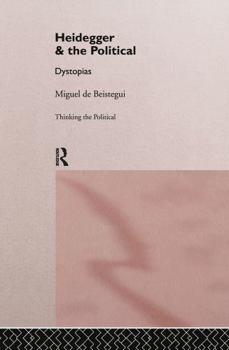Heidegger and the Political
Select Format
Select Condition 
Book Overview
Recent studies of Heidegger's involvement with National Socialism have often presented Heidegger's philosophy as a forerunner to his political involvement. This has occured often to the detriment of the highly complex nature of Heidegger's relation to the political. Heidegger and the Political redresses this imbalance and is one of the first books to critically assess Heidegger's relation to politics and his conception of the political.
Miguel de Beistegui shows how we must question why the political is so often displaced in Heidegger's writings rather than read the political into Heidegger. Exploring Heidegger's ontology where politics takes place after a forgetting of Being and his wish to think a site more originary and primordial than politics, Heidegger and the Political considers what some of Heidegger's key motifs - his emphasis on lost origins, his discussions of Holderlin's poetry, his writing on technology and the ancient Greek polis - may tell us about Heidegger's relation to the political. Miguel de Beistegui also engages with the very risks implicit in Heidegger's denial of the political and how this opens up the question of the risk of thinking itself.
Heidegger and the Political is essential reading for students of philosophy and politics and all those interested in the question of the political today.
Miguel de Beistegui shows how we must question why the political is so often displaced in Heidegger's writings rather than read the political into Heidegger. Exploring Heidegger's ontology where politics takes place after a forgetting of Being and his wish to think a site more originary and primordial than politics, Heidegger and the Political considers what some of Heidegger's key motifs - his emphasis on lost origins, his discussions of Holderlin's poetry, his writing on technology and the ancient Greek polis - may tell us about Heidegger's relation to the political. Miguel de Beistegui also engages with the very risks implicit in Heidegger's denial of the political and how this opens up the question of the risk of thinking itself.
Heidegger and the Political is essential reading for students of philosophy and politics and all those interested in the question of the political today.
Format:Hardcover
Language:English
ISBN:0415130638
ISBN13:9780415130639
Release Date:November 1997
Publisher:Routledge
Length:216 Pages
Weight:1.07 lbs.
Dimensions:0.6" x 6.1" x 9.2"
Customer Reviews
1 rating
Heideggger's Nazism revisited
Published by Thriftbooks.com User , 23 years ago
There is a veritable cottage industry of writings on Heidegger's Nazism, Julian Young's book "Heidegger, philosophy, Nazim" being the most well-known apologist for Heidegger. Recent books such as this one and the excellent "Historical Destiny and National Socialism in Heidegger's 'Being and Time'" by Johannes Fritsche (another 5-star book) would surely need to add something to the already over-worked debate, and indeed they do. They go beyond political introspection and historical incidents such as Heidegger's physical signing on the dotted line of Nazi party membership to the texts themselves. To take some brief examples, Beistegui points to the exact texts in Being & Time where the concept of history is politically oriented and history identified with destiny. Moreover, Heidegger's Nazism did not come to and end with his active involvement in party politics and his so-called turn to aesthetics, albeit that he criticized actual Nazi party ideologies - art as the event of the disclosure of truth. For instance, Heidegger's view of the 'polis' is still mythological. Also if art itself for Heidegger is 'merely' the disclosure of being, and thus epi-phenomenal, the same most certainly goes for ethics and historical events such as the holocaust, which was 'merely' another event from the perspective of being (see especially pages 151-157).





